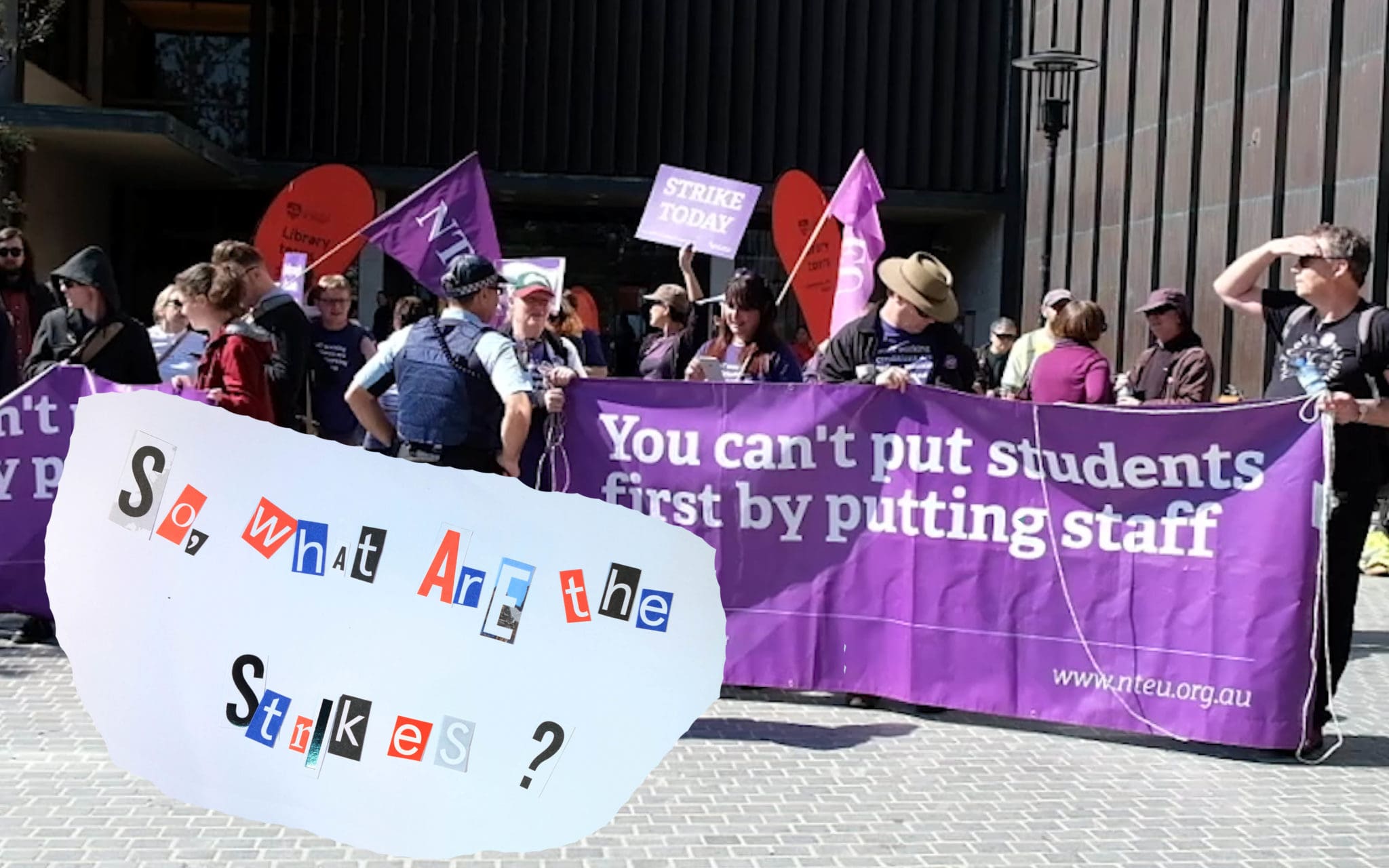You’ve probably heard that many of your teachers will be on strike this Wednesday — and you may be wondering why. Here are a few of your questions about what’s going on, answered.
Why are staff striking?
On March 31 of this year, the previous enterprise bargaining agreement (EBA) between the university and its staff expired. The National Tertiary Education Union (NTEU) has been in negotiations with university management since then, trying to achieve the pay rates and conditions that they are asking for.
On Wednesday, staff will be on strike for 24 hours to put pressure on university management to grant more of the NTEU’s claims. This means they won’t be taking their classes or doing any of the work that they’d usually be doing. Instead, they’ll be forming picket lines at each entrance of the university, and they’ve asked students not to go to classes in solidarity.
Wait, what’s an EBA?
An EBA is a legally binding agreement between an employer (in this case, university management) and their employees (in this case, university staff), who are often represented by a trade union (in this case, the NTEU). EBAs, also known as collective agreements, dictate how much employees get paid, as well as other entitlements like paid leave and superannuation contribution rates. They differ from industrial awards, which set rates of pay and conditions for all the employees in one industry or occupation, since they only pertain to one employer and workplace.
Historically, once an EBA is agreed upon by both the employer and the union, the staff of the university vote the agreement in. Last week, however, university management sent an email to all staff asking them to vote on whether they would accept the current pay offer, hoping to circumvent the union. Of 6400 staff, 4349 voted, and more than 60% voted to reject the offer and continue bargaining.
What is the NTEU hoping to achieve at the bargaining table?
The NTEU is fighting for a number of claims: among other things, they want casual workers to receive 17 per cent employer superannuation contribution, or the same rate as permanent staff members; they want zero forced redundancies; they want casual staff to be given sick and parental leave; and they want the 40/40/20 split of teaching, research and administrative work for academic staff to be preserved.
On the wages front, the university has put forward an offer of a 2.1 per cent per year pay rise, but since the Reserve Bank of Australia tries to keep increases in inflation between 2 to 3 per cent every year, and the current rate of inflation is higher than 2.1 per cent, staff could be hit with a real wage cut.
To understand this, let’s imagine a staff member has a salary of $50,000. Let’s also imagine inflation goes up 2.5 per cent a year from 2017 to 2020 — the length of the agreement. $50,000 in 2017 would be equivalent to $53,844 in 2020; living costs would grow at the same rate, meaning that, while the sum of money is bigger, its purchasing power remains the same. However, with a 2.1 per cent pay rise relative to the 2017 salary figure, by 2020 that staff member’s salary would only be $53,216, meaning the actual purchasing power of that staff member’s salary would be reduced by around $600 for that year.
For their part, the NTEU are pushing for a 2.4 per cent per year pay rise over the life of the agreement; as Honi has reported in the past, since staff wages amount to over $1 billion dollars, the 0.3 per cent disparity would in fact amount to a $3 million dollar difference for the university.
What about Open Day?
There has already been one day of strike action this year; on Saturday, August 26, the university’s Open Day, staff handed out leaflets at high-traffic entrances to the university, as well as choosing not to man information desks in their respective departments.
The last time a new agreement was negotiated was 2013; in that year, strikes lasted a total of seven days, and on several occasions, police clashed with staff and students in violent confrontations.
Will I be penalised for not going to class?
Maybe. Some teachers won’t be penalising their students, while some might. If your teacher isn’t striking, it’s probably best to check with them first.
I’m still going to class. Why are the picketers calling me a scab?
‘Scab’ is a pejorative term used to refer to people who break or cross picket lines, also known as strikebreakers. Strikebreakers are usually people who work while their colleagues are striking, but here, it also refers to students. You may have, for example, seen some people calling the USU a ‘scab union’ for not ceasing operations in solidarity with the staff strikes. Best way to avoid being called a scab? Don’t go to class.





